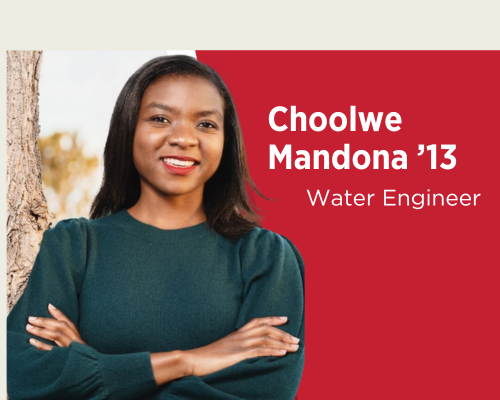Solving the problem at the root: A conversation with water engineer Choolwe Mandona ’13
Choolwe Mandona’s approach to systems engineering helps provide clean drinking water to communities.

Solving the problem at the root: A conversation with water engineer Choolwe Mandona ’13
Growing up in Zambia, Choolwe Mandona did not always plan on becoming an engineer. “I actually was pretty afraid to do engineering,” said Choolwe, who graduated from Miami University in 2013 with a bachelor’s degree in Chemical Engineering and a concentration in environmental engineering. “I always considered it tough, and I just did not think I was capable of being an engineer, actually.” Instead, Choolwe set her sights on becoming a medical doctor – albeit with some reservations. “I’m more of a believer in solving the root cause of a problem,” said Choolwe. Rather than treating symptoms of a larger problem, she said, “I would rather fix the problem that's the root cause.”
What root cause was Choolwe seeing growing up in Zambia? “Especially in the hot, rainy seasons, there would be a lot of cholera breakouts,” explained Choolwe. “Cholera is a diarrheal disease, it's a waterborne disease that people get from drinking dirty water. And I thought to myself, if I'm a doctor, and somebody with a waterborne disease comes to me, I will wonder, ‘Why can't I solve the problem of lack of clean water?’ So that sort of started to deviate my thoughts from being a medical doctor. I thought, ‘What kind of person wants to solve a problem systematically and to help a large group of people?’ I had a teacher that told me, ‘You know, you could be an engineer.’”
Today, Choolwe is a Senior Process Engineer at Mott MacDonald in Cambridge, UK, where she applies systems thinking around the treatment of drinking water for safe consumption. Her journey toward this position included training and skill-building in engineering, leadership, and communication at Miami University. “Miami gave me a well-rounded education experience,” said Choolwe. “Because Miami had this emphasis on doing electives outside your coursework, I had the chance to do things like theater and public speaking.” Choolwe said that taking coursework outside of engineering helped give her a well-rounded education experience. “I didn't come out with just an engineering degree from Miami. I came out with leadership and communication skills that set me off to do good things.”
What else does Choolwe appreciate about her years at Miami? Her advisor, Professor Cathy Almquist. “Professor Almquist was very readily available for me and willing to listen. She gave me strategies on what classes to take, and talked with me about my pathway to graduation. I was new to the American academic system, so it was nice to have an advisor that was able to say, ‘Hey, this is what you need to do.’” Choolwe was also a member of the African Student Union at Miami University, a student organization which remains active on campus. Choolwe found this student group very meaningful: “It brought together Africans – or even people that were interested in African culture – together. We shared food, stories, and experiences. We helped each other out, and organized events to bring Miami students together. So there was a lot of leadership learning as well.”
After graduating from Miami in 2013, Choolwe went on to earn her Master’s degree in Civil and Environmental Engineering from University of Colorado Boulder before entering the engineering workforce full time. Over the years, Choolwe has discovered that her communication skills, along with her engineering skills, have helped her succeed. Choolwe said, “I have discovered that I really work well with people. Communicating, expressing ideas, liaising with all kinds of people – whether it’s a water treatment operator, somebody who's working at the treatment facility, our team, or to people of all management levels.” These communication skills have allowed Choolwe to become adept at technically understanding what the problem is. “Sometimes it could seem like there's so many issues,” said Choolwe, “but then you figure out the root of the problem. Let's say I'm working with a client, and they're expressing what their issues are. Sometimes you just kind of have to say, what are they really saying? And I think that's where my strengths are.”
Choolwe’s expectation of what it means to be an engineer has evolved over time. “When I first started off my career,” she said, “I pre-judged what it meant to be an engineer.” Now, she says, “over my years of working on different projects with different people and in different countries, and now different continents, I'm starting to see the whole picture coming together.” This experience has offered her valuable insights into the nature of problem-solving, and what’s really required to create solutions benefiting all. When asked what advice she would give current undergraduate engineering students, Choolwe said: “I would advise engineering students to be patient with their learning process. If they really want to problem solve, and create something for the next generation, or for society in general, you really have to master solving one problem at a time, and be steadfast and consistent in doing that. Over time, you eventually can see problems really quickly and know what solution you need to provide to that. But if you really want to be a problem solver, you're going to have to respect the process of mastery.”